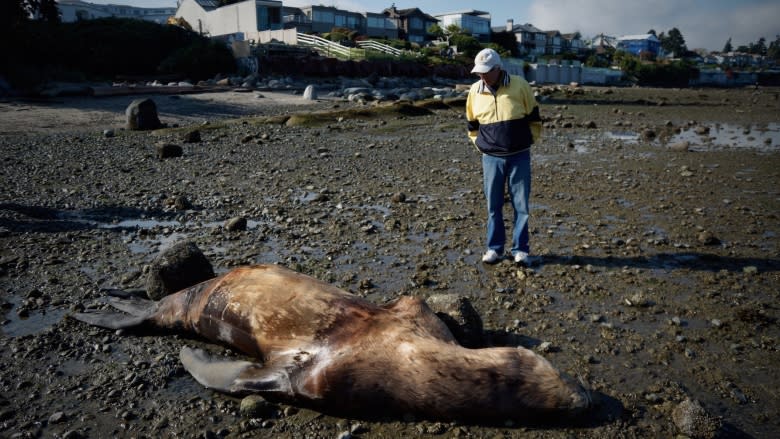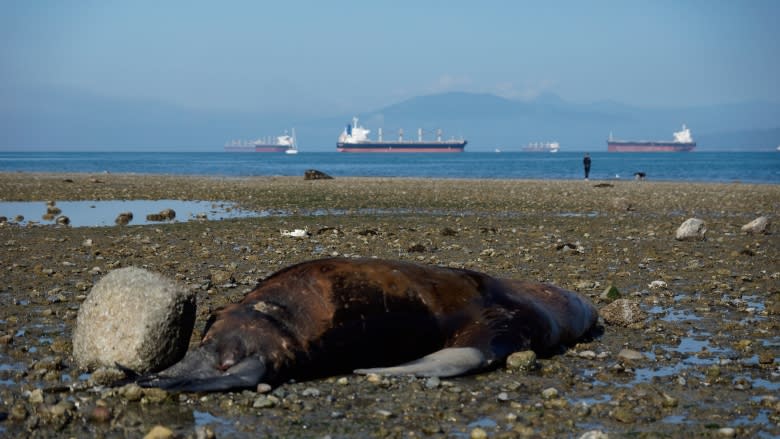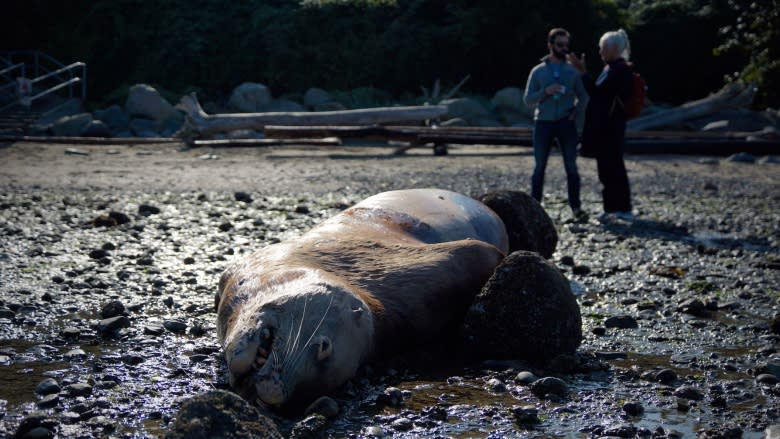'This thing could just explode': dead sea lion concerns Point Grey beach users
A sea lion carcass washed up on the beach in Vancouver's Point Grey neighbourhood is attracting plenty of attention, and some beach users are hoping that someone steps in to dispose of the bloating beast.
"I imagine that this thing could just explode. That's part of nature taking its course. It could just explode," said nearby resident Ross McIntosh, who walks on the beach near MacDonald Street every day.
McIntosh is concerned the animal's thick flesh will allow enough pressure to build up that the carcass catastrophically erupts, but according to Vancouver Aquarium research biologist Chad Nordstrom, that seems unlikely.
"It certainly can get bloated, but usually when a carcass is decomposing like this, enough natural — and critters — and environmental factors will slowly open up holes and allow the gas to vent in a safe manner," he said. "I don't expect there will be any exploding sea lions."
"A dead sea lion in English Bay is a relatively rare occurrence, but it's fairly common for the B.C. coast, and even around the Lower Mainland in general," said Nordstrom.
On Friday, beach users including McIntosh figured the carcass had been on the beach for 10 days. It first showed up farther west, but someone had apparently tried to drag it into the water, and it had washed back up near Volunteer Park.
"I've never, like, seen one before," said Riley, 5, who was enjoying a day off school on the beach. "[I] just stayed back at first when I saw it ... I thought it was alive at first."
"To have a carcass wash up presents a novel opportunity for the public and for kids, anyone else, residents in the area to see an animal like that up close," said Nordstrom.
"I wouldn't suggest pawing in it with your bare hands then going home and having supper. You know these are the same types of common-sense precautions that you'd want to take — it's probably not best to handle dead wildlife of any description," he said.
McIntosh just wants someone to come in and take care of the carcass before it gets nasty.
"It's just brewing in there. I can't imagine what's going on," he said, adding that he measured it to be 10 feet long from snout to the tip of its flippers, and guessed it weighed about 800 pounds.
"I have phoned the city. They said it's not their jurisdiction. It's federal. I phoned fisheries, and I talked to a very nice person there who said they didn't want to have anything to do with it," said McIntosh.
A spokesperson with Fisheries and Oceans Canada said in an emailed statement that the department is aware of the sea lion, but usually allows carcasses to decompose naturally.
"In cases where the animal has washed up in a public area, responsibility for removal or cordoning off the area rests with the city or municipality. Our marine mammal coordinator has contacted the City of Vancouver to confirm DFO's role in this case," the statement read.
The DFO advises members of the public to keep away from the carcass.
The Vancouver Park Board says it is aware of the sea lion and will be "co-ordinating its removal with other local agencies.
Doreen Hughes, who visits the beach every morning, suggested some sort of ceremony to honour the sea lion might be appropriate.
"You want to observe the fact of your life and life in general," she said.
Nordstrom notes that if anyone wants to see a sea lion up close while it's still alive, they can check out the Vancouver Aquarium.
And those sea lions are pretty much guaranteed not to explode.
Follow Rafferty Baker on Twitter: @raffertybaker




